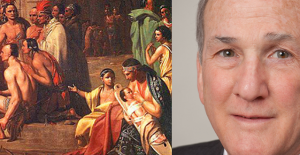
By Matt Rooney | The Save Jersey Blog
Here we go again, Save Jerseyans. I couldn’t make this stuff up if I wanted to…
Rutgers University President Robert Barchi, who earlier this fall announced a new “University-wide Diversity and Inclusion Office” at the notoriously mismanaged liberal campus populated by pro-ISIS professors, pedophilia apologists, racist cheeseburgers and microaggressive mascots, apparently decided to celebrate his institution’s 250th birthday with a Monday morning e-mail blast authored by Chancellor Richard L. Edwards apologizing for… mistreatment of Indians and slaves.

“As some in the Rutgers community have pointed out in recent weeks, we must acknowledge that our history also includes some facts that we have ignored for too long, such as that our campus is built on land taken from the Lenni-Lenape and that a number of our founders and early benefactors were slave holders,” Dr. Edwards, whose background is in social work (LOL!), explained to the campus community. “Given our history as a colonial college, these are facts not unique to Rutgers, but it is time that we begin to recognize the role that disadvantaged populations such as African Americans and Native tribes played in the University’s development.”
Naturally, the only way for a liberal to truly prove that he or she cares about the dispossessed is to throw money at the problem – ideally someone else’s money – and form a committee to spend it. The humorless RU administration doesn’t appreciate the irony of it all.
“I am therefore announcing the formation of a committee to study enslaved and disenfranchised populations in Rutgers history,” he continued. “This committee will be charged with examining the role that the people of these disadvantaged groups played in the founding and development of Rutgers University, and with making recommendations to me on how the University can best acknowledge their influence on our history. The committee will be composed of faculty, staff and student members.”
Some birthday party, huh? I don’t know about you, Save Jerseyans, but digging up 250-year-old skeletons to appease professionally-offended academics and brainwashed students cowering in their safe spaces isn’t exactly my idea of a fun time. Pass the cake, please. Extra icing. Whichever flavor is the most microaggressive will do nicely, though with so many tax dollars (and loan payments) going to subsidize this crap, it’ll be a miracle if I can keep any of it down.
This is the same school, after all, whose faculty and students chased away would-be commencement speaker Condi Rice who is African and Native American. Again… the irony is lost on these people!
The full e-mail is below the fold…
Subject: Formation of the Committee on Enslaved and Disenfranchised Populations in Rutgers History
From: “Richard L. Edwards” <chancellornb@rutgers.edu>
Date: Tue, November 10, 2015 11:13 am
To: CHANCELLOR_NB_ADMIN_ALL@RAMS.rutgers.edu (more)
Priority: NormalRutgers University begins today the yearlong celebrations that will culminate next year in the 250th anniversary of the University’s founding in 1766 in New Brunswick. Throughout the next twelve months, special events and programs will examine and celebrate the University’s revolutionary pursuit of teaching, research and service.
As some in the Rutgers community have pointed out in recent weeks, we must acknowledge that our history also includes some facts that we have ignored for too long, such as that our campus is built on land taken from the Lenni-Lenape and that a number of our founders and early benefactors were slave holders. Given our history as a colonial college, these are facts not unique to Rutgers, but it is time that we begin to recognize the role that disadvantaged populations such as African Americans and Native tribes played in the University’s development.
I am therefore announcing the formation of a committee to study enslaved and disenfranchised populations in Rutgers history. This committee will be charged with examining the role that the people of these disadvantaged groups played in the founding and development of Rutgers University, and with making recommendations to me on how the University can best acknowledge their influence on our history. The committee will be composed of faculty, staff and student members.
The committee may, for example, recommend the installation of historical markers to commemorate the contributions of Native Americans and African Americans, as well as the establishment of symposia, lectures, talks, and teach-ins to address the historical context.
Wrestling with such issues in our history is not unique to Rutgers. Brown University, for instance, founded just two years before Rutgers, formed a similar committee which was charged by its then-President, Ruth Simmons to “examine the University’s historical entanglement with slavery and the slave trade and report our findings openly and truthfully.” The report the Brown committee issued was extensive and honest and I will ask our committee for the same vigorous pursuit of the truth.
In my 11 years at Rutgers-New Brunswick, I have become a fierce supporter and champion of this incredible institution; I am proud of it like none other. But to truly praise Rutgers, we must honestly know it; and to do that, we must gain a fuller understanding of its early history. I look forward to reading the committee’s report and recommendations.
Richard L. Edwards, Ph.D.
Chancellor, Rutgers-New Brunswick
_____



Even the Catholic U’s don’t get upset with the Inquisition.
What an amazing reckoning these kids are going to have when they enter the real world.
Rutgers sucks been like they for awhile -American haters and lesbians
Nothing better to spend time and money on really dislike these schools -where does one send their white devil kids?
These colleges are getting seriously out of control. What happened???
Ugh!
Typical and predictable nonsense by blathering idiots . Take note on how colonization is always characterized by the deranged, Marxist left as an invasion, theft; and violent takeover; illegals flowing over the border demanding rights, financial and political resources and committing heinous and violent acts making up 40% of all federal prisoners, not so much.